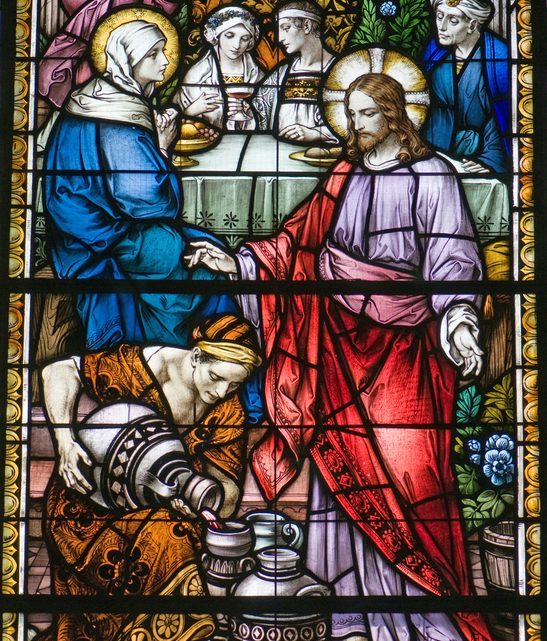We teach children to pray over the small things in their lives, lost pets, even lost toys. As adults, we often reserve prayer to the more important things in our lives, the significant decisions we need to make. We tend to think that God is not really interested in some of our smaller concerns. Is this true? That question was settled nearly 2000 years ago in a small town in Galilee. If not for the Gospel of John, we would never have known about this celebration, or have seen the significance God places on even the small things in our lives.
It is a simple story that almost everyone knows. A wedding is held in Cana, a village not far from Jesus’ home in Nazareth. John tells us that Jesus mother was there, and then adds that Jesus and his disciples were also present. Jewish weddings in the first century were weeklong affairs, where friends, neighbors, and relatives feasted and danced and generally celebrated the new union. Exactly how far into the celebration this event took place we are not told. The account, like much of John, is simple and straightforward — deceptively so.
When the wine ran out, Jesus’ mother said to him, “They have no wine.”
Jesus said to her, “Woman, what does that have to do with you and me? My hour has not yet come.”—John 2:3, 4.
The marvelous economy of John conceals within these few words an amazing amount of content. First of all, it simply says “When the wine ran out,” as if that was an expected occurrence. But it was not. When the wine ran out, the celebration was over, and if it ran out before the appointed time, it would be a great embarrassment to the host, and to the newlywed couple. John tells us none of that, because he expects his audience to already know it. In our terms, it would be something like the wedding cake not showing up for the reception. Everyone expected it, and its absence would be an occasion of note.
Next, we have the simple statement that when the wine ran out, “Jesus’ mother said to him, ‘They have no wine.'” The third person pronoun, “they,” tells us that whether they were related to the bride and groom or not, Jesus and his mother were not officially part of the wedding party – rather, they were guests. If there is embarrassment over the lack of wine, it cannot be considered their responsibility. Jesus’ reply indicates that. “What does that have to do with you and me?” Probably in our language, that would come out something like, “Why do youmention that? That is not our problem.”
But then Jesus says six words whose significance it is easy to overlook: “My hour has not yet come.”
If we were not familiar with the Gospel of John, these words would simply seem odd, out of place. What does “his hour” have to do with the wedding’s lack of wine? And again, unless we expect something unusual from Jesus, what is the purpose of this whole exchange?
As indicated earlier, this story occurs only in the Gospel of John and in the Gospel of John, the concept of Jesus’ “time,” or “hour,” occurs repeatedly. It appears to refer to some sort of divine schedule for Jesus’ life and ministry. In John chapter 7, Jesus’ brothers taunt him, urging him to go to Jerusalem so that his disciples may see his ‘mighty works.’ We are explicitly told they do not believe in him, and apparently they think he has delusions of grandeur, which they want to dispel. But Jesus refuses, telling them it is not time—not his hour—for him to go.
Several days later, when he does go to the Feast of the Tabernacles, his preaching enrages the crowd, but we are told, “They sought therefore to take him; but no one laid a hand on him, because his hour had not yet come.”
Similarly, when the time is right, when his hour arrives, he takes action and will not be deterred. In the 12th chapter of the Gospel of John, after we have been informed that the Jews are actively seeking to kill Jesus, he tells Andrew and Philip, “The time has come for the Son of Man to be glorified.” Jesus makes it clear that this “glorification” means his death, when he says, “Now my soul is troubled. What shall I say? ‘Father, save me from this time?’ But for this cause I came to this time.”
More than a dozen times in the Gospel of John, Jesus refers to his hour or his time, and refuses to deviate from it, even when following this timeline means meeting his death. So when he tells his mother, “My hour is not yet,” he is speaking of this divine schedule. That’s what makes this episode, even beyond the miracle that is to follow, so significant.
He says his hour has not yet come, but he acts anyway. It is the only time in John’s gospel that he deviates from the divinely appointed schedule.
Read other posts in the “Matriarchs and Prophets” series.









